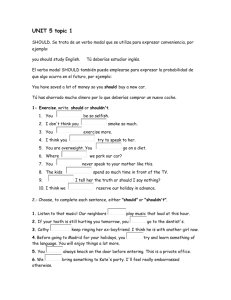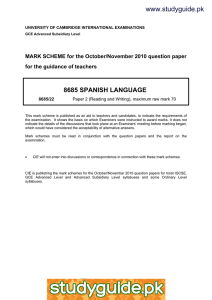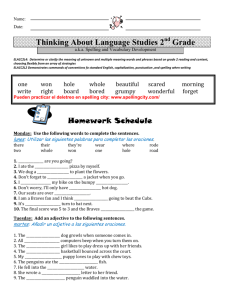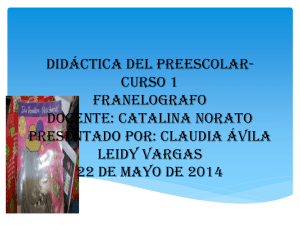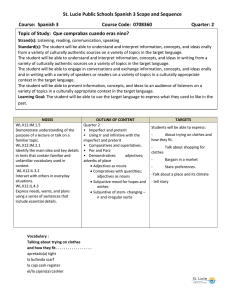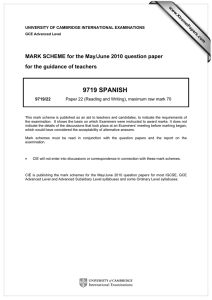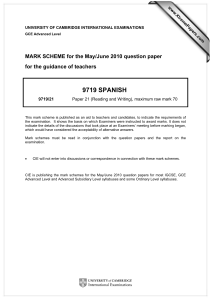9719 SPANISH MARK SCHEME for the October/November 2010 question paper
advertisement
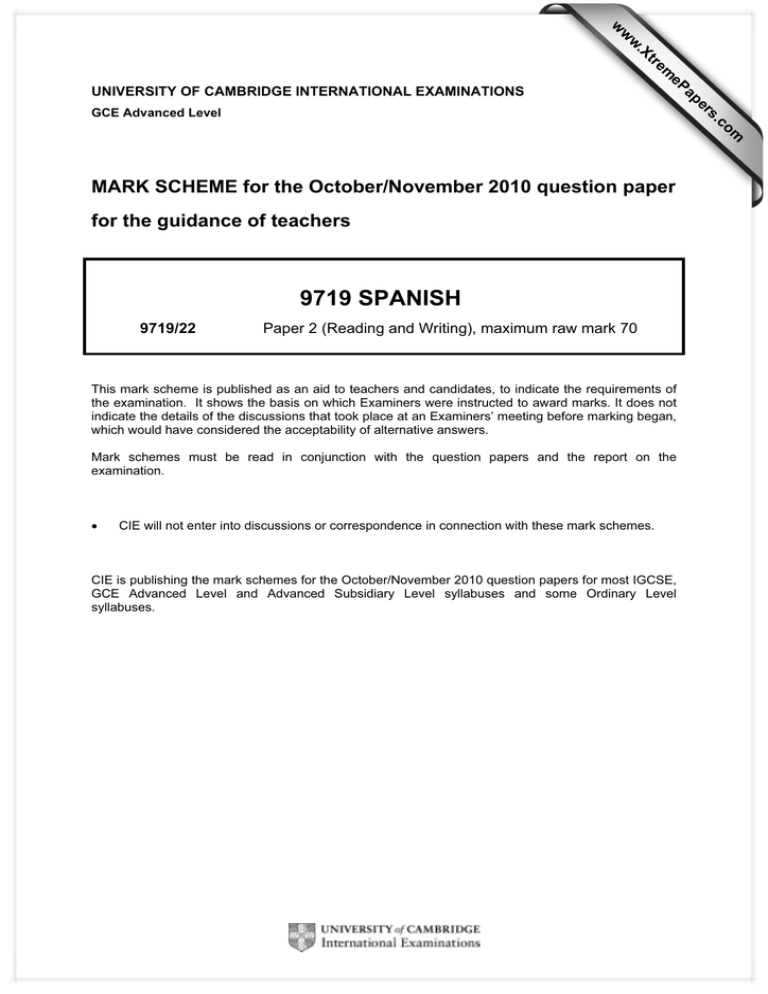
w w ap eP m e tr .X w UNIVERSITY OF CAMBRIDGE INTERNATIONAL EXAMINATIONS s er om .c GCE Advanced Level MARK SCHEME for the October/November 2010 question paper for the guidance of teachers 9719 SPANISH 9719/22 Paper 2 (Reading and Writing), maximum raw mark 70 This mark scheme is published as an aid to teachers and candidates, to indicate the requirements of the examination. It shows the basis on which Examiners were instructed to award marks. It does not indicate the details of the discussions that took place at an Examiners’ meeting before marking began, which would have considered the acceptability of alternative answers. Mark schemes must be read in conjunction with the question papers and the report on the examination. • CIE will not enter into discussions or correspondence in connection with these mark schemes. CIE is publishing the mark schemes for the October/November 2010 question papers for most IGCSE, GCE Advanced Level and Advanced Subsidiary Level syllabuses and some Ordinary Level syllabuses. Page 2 Mark Scheme: Teachers’ version GCE A LEVEL – October/November 2010 Syllabus 9719 Paper 22 Section 1 1 Busca expresiones en el texto que sean equivalentes a las que aparecen abajo: (a) pasa muy a menudo (ocurre con frecuencia) (b) la aplicación de la penalización deja mucho que desear [1] (la legislación no adecuadamente) se aplica [1] (c) carecen de control por parte de las autoridades (no son supervisadas oficialmente) [1] (d) sirven como fuente de venta clandestina (venden de modo ilícito) [1] (e) como un simple antojo (por puro capricho) [1] [Total: 5 puntos] 2 Cambia cada una de las siguientes frases, expresando las mismas ideas, pero usando la forma exacta de la palabra o las palabras que aparecen entre paréntesis ( ). The following are examples of the way in which the answers could be expressed. Answers should fit into the original text, retaining the same meaning, and contain all elements of the phrase to be re-worked. (a) lleva años saturada [línea 8] (hace) hace años que está saturada / está saturada desde hace años [1] (b) hemos tenido que adaptar [línea 9] (preciso) ha sido preciso adaptar / ha sido preciso que adaptáramos / adaptemos accept: era / fue / se ha resultado refuse: es [1] (c) no podemos acoger a ninguno [línea 11] (es imposible que) es imposible que acojamos a ninguno accept: podamos acoger [1] (d) es mejor que dejen atado al perro [línea 12] (dejado) es mejor que el perro sea dejado atado accept: es / será mejor haber dejado atado al perro es mejor el perro dejado atado es mejor / preferible que hayan dejado atado al perro es mejor si el perro es dejado atado refuse: esté dejado el perro debe ser dejado atado © UCLES 2010 [1] Page 3 Mark Scheme: Teachers’ version GCE A LEVEL – October/November 2010 Syllabus 9719 Paper 22 (e) en España se abandonan más perros que en otros países [líneas 20–21] (tantos) en otros países no se abandonan tantos perros como en España accept: se abandonan tantos más perros en España que en otros países se abandonan tantos perros en España, más que en otros paises refuse: answers which collocate tantos with países [1] [Total: 5 puntos] 3 Contesta en español las siguientes preguntas, sin copiar frases completas (más de 4 palabras consecutivas) del texto. NB. Lifting = more than 4 consecutive words taken from the text and will usually invalidate answer unless further original explanation is offered. (a) ¿Por cuáles razones se suele abandonar a los animales en España? (párrafo 1) (4 from 5) fueron regalados por capricho la pareja se divorcia la mujer va a dar a luz fallos en la legislación municipal / de las autoridades apuros económicos / pobreza etc. [1] [1] [1] [1] [1] (b) (i) Según lo que has leído, ¿por qué crees que hubo tantos abandonos en Barcelona en agosto? (párrafo 2) no quieren / pueden llevar el animal de vacaciones (or any other valid reason) [1] (ii) Según Montse Fernández, ¿dónde es preferible abandonar a un animal? y ¿por qué? (párrafo 2) fuera del local de la Sociedad Protectora de Animales accept: cerca de / junto a refuse: a / en se esforzarán por recibirlo accept: lo admitirán etc. en la calle moriría aplastado o por falta de comida (both needed) [1] [1] [1] (c) Según Montse, ¿por qué es tan difícil aplicar la legislación contra el abandono de animales en Barcelona? (párrafo 3) es difícil probar que han abandonado a un animal siendo tan altas las multas / para evitar pagar las multas (causality needed) los dueños siempre dicen que el animal se escapó © UCLES 2010 [1] [1] [1] Page 4 Mark Scheme: Teachers’ version GCE A LEVEL – October/November 2010 Syllabus 9719 Paper 22 (d) ¿Por qué cree Montse que las tiendas de animales en España son inadecuadas? (párrafo 4) no son controladas (por las autoridades) exponen a los animales en los escaparates [1] [1] (e) En la opinión de Montse, ¿de qué son culpables estas tiendas? (párrafo 5) (2 from 3) venden toda clase de animales venden a los animales ilícitamente animan a la gente a comprar por capricho a los animales [1] [1] [1] Quality of Language: Accuracy (same as for questions 4 and 5) [5] 5 Very good Consistently accurate. Only very few errors of minor significance. Accurate use of more complex structures (verb form, tenses, prepositions, word order.) 4 Good Higher incidence of error than above, but clearly has a sound grasp of the grammatical elements in spite of lapses. Some capacity to use more accurately more complex structures. 3 Sound Fair level of accuracy. Common tenses and regular verbs mostly correctly formed. Some problems in forming correct agreement of adjectives. Difficulty with irregular verbs, use of prepositions. 2 Below average Persistent errors in tense and verb forms. Prepositions frequently incorrect. Recurrent errors in agreement of adjectives. 1 Poor Little or no evidence of grammatical awareness. Most constructions incomplete or incorrect. Consistent and repeated errors. For question 3 and 4, the 5 marks for the quality of language will be awarded globally for the whole performance on each set of answers. With regard to length, a concise answer containing all markbearing components for content is scored on the full range of marks for language, i.e. length does not determine the quality of the language mark. An answer scoring 0 for content cannot score any language marks, and the total available on the whole set of answers will therefore be affected. The final total for language will be reduced on the following scale: Answer(s) worth 2 or 3 scoring 0 for content: reduce final assessment by –1 Answer(s) worth 4 or 5 scoring 0 for content: reduce final assessment by –2 Answer(s) worth 6 or 7 scoring 0 for content: reduce final assessment by –3 Answer(s) worth 8 or 9 scoring 0 for content: reduce final assessment by –4 Note: A minimum of 1 mark for quality of language should be awarded if there are any content marks at all (ie. 0 language marks only if 0 content marks). [Total: 20] © UCLES 2010 Page 5 4 Mark Scheme: Teachers’ version GCE A LEVEL – October/November 2010 Syllabus 9719 Paper 22 Contesta en español las siguientes preguntas, sin copiar frases completas (más de 4 palabras consecutivas) del texto. NB. Lifting = more than 4 consecutive words taken from the text and will usually invalidate answer unless further original explanation is offered. (a) ¿Cuáles son las acciones humanas que afectan más a las especies animales? (párrafo 1) la cacería ilegal el tráfico ilícito / mercado negro etc de animales salvajes [1] [1] (b) ¿Qué medidas han tomado los gobiernos para remediar la situación? (párrafo 2) (3 from 4) intentan aumentar el nivel de conciencia del problema han limitado las temporadas de cazar / pescar han establecido cuotas de caza han creado parques naturales donde los animales están protegidos [1] [1] [1] [1] (c) ¿Qué factores favorecen el tráfico de animales? (párrafo 3) es un negocio que genera mucho dinero existe mucha demanda de las pieles de los animales / reptiles 1 mark only if notion of money is related solely to furs / hides etc. la gente quiere animales exóticos de compañía [1] [1] [1] (d) Aparte de la caza y la captura indiscriminadas, explica la otra manera en que el hombre amenaza a los animales. (párrafo 4) introduce nuevas especies a un hábitat estas compiten con los animales originarios [1] [1] (e) (i) Explica por qué fue necesario introducir el zorro en Australia? y ¿cuál fue el resultado? (párrafo 5) [5] introdujeron zorros para controlar los conejos habían soltado conejos en un país sin predadores naturales los zorros han competido con / han eliminado especies nativas [1] [1] [1] (ii) ¿Qué ocurrió en Brasil? (párrafo 6) importaron abejas (de África) para producir una miel mejor (reason needed) estas suelen atacar a los animales y los hombres que los padres compren libros a sus hijos © UCLES 2010 [1] [1] Page 6 Mark Scheme: Teachers’ version GCE A LEVEL – October/November 2010 Syllabus 9719 Quality of Language: Accuracy (same as for questions 3 and 5) 5 Very good Consistently accurate. Only very few errors of minor significance. complex structures (verb form, tenses, prepositions, word order.) Paper 22 [5] Accurate use of more 4 Good Higher incidence of error than above, but clearly has a sound grasp of the grammatical elements in spite of lapses. Some capacity to use more accurately more complex structures. 3 Sound Fair level of accuracy. Common tenses and regular verbs mostly correctly formed. Some problems in forming correct agreement of adjectives. Difficulty with irregular verbs, use of prepositions. 2 Below average Persistent errors in tense and verb forms. Prepositions frequently incorrect. Recurrent errors in agreement of adjectives. 1 Poor Little or no evidence of grammatical awareness. Most constructions incomplete or incorrect. Consistent and repeated errors. For question 3 and 4, the 5 marks for the quality of language will be awarded globally for the whole performance on each set of answers. With regard to length, a concise answer containing all markbearing components for content is scored on the full range of marks for language, i.e. length does not determine the quality of the language mark. An answer scoring 0 for content cannot score any language marks, and the total available on the whole set of answers will therefore be affected. The final total for language will be reduced on the following scale: Answer(s) worth 2 or 3 scoring 0 for content: reduce final assessment by –1 Answer(s) worth 4 or 5 scoring 0 for content: reduce final assessment by –2 Answer(s) worth 6 or 7 scoring 0 for content: reduce final assessment by –3 Answer(s) worth 8 or 9 scoring 0 for content: reduce final assessment by –4 Note: A minimum of 1 mark for quality of language should be awarded if there are any content marks at all (i.e. 0 language marks only if 0 content marks). [Total: 20] © UCLES 2010 Page 7 5 Mark Scheme: Teachers’ version GCE A LEVEL – October/November 2010 Syllabus 9719 Paper 22 Escribe en español un máximo de 140 palabras para completar las dos tareas siguientes. (a) Escribe un resumen de lo que se dice en los dos textos sobre cómo los humanos tratan mal a los animales. [10] (b) ¿Tratan bien a los animales en tu país? Da tus opiniones. [5] (NOTA: Escribe un máximo de 140 palabras) Length of response • Examiners make a rough estimate of the length by a quick calculation of the number of words on a line. • If the piece is clearly too long, calculate the length more precisely. • Then put a line through that part of the summary which exceeds 160. • Marks will be totalled at the bottom in the following sequence: Out of 10 for points scored in summary Out of 5 for personal response Out of 5 for language Total ringed out of 20 Content marks: Summary [10] The summary could include the following points (award 1 mark for each point covered up to a maximum 10): • • • • • • • • los animales son abandonados porque: son regalos no deseados / compra compulsiva hay dificultades domésticas (embarazo, divorcio, dinero) (credit 1 only) hay una falta de control de las autoridades no los quieren llevar de vacaciones es fácil decir que el animal se escapó hay tiendas que venden animales ilegalmente / exponen al animal en la vitrina la deforestación / la contaminación son cazados ilegalmente / caza no reglamentada / indiscriminada hay mucho tráfico ilícito de animales hay una industria importante de pieles la gente quiere mascotas exóticas que no sobreviven (el cambio de hábitat) introducen especies que compiten con las especies nativas © UCLES 2010 Page 8 Mark Scheme: Teachers’ version GCE A LEVEL – October/November 2010 Content marks: Response to the Text Syllabus 9719 Paper 22 [5] Mark like a mini-essay according to the variety and interest of the opinions and views expressed, the response to the original text stimulus and the ability to express a personal point of view. 5 Very good Varied and interesting ideas, showing an element of flair and imagination, a capacity to express a personal point of view. 4 Good Not the flair and imagination of the best candidates, but work still shows an ability to express a range of ideas, maintain interest and respond to the issues raised. 3 Sound A fair level of interest and ideas. May concentrate on a single issue, but there is still a response to ideas in the text. 2 Below average Limited range of ideas; rather humdrum. May disregard the element of response to the text, and write a largely unrelated free-composition. 0–1 Poor Few ideas to offer on the theme. Banal and pedestrian. No element of personal response to the text. Repeated error. Quality of Language: Accuracy (same as for questions 3 and 4) [5] 5 Very good Consistently accurate. Only very few errors of minor significance. Accurate use of more complex structures (verb forms, tenses, prepositions, word order). 4 Good Higher incidence of error than above, but clearly has a sound grasp of the grammatical elements in spite of lapses. Some capacity to use accurately more complex structures. 3 Sound Fair level of accuracy. Common tenses and regular verbs mostly correctly formed. Some problems in forming correct agreement of adjectives. Difficulty with irregular verbs, use of prepositions. 2 Below average Persistent errors in tense and verb forms. Prepositions frequently incorrect. Recurrent errors in agreement of adjectives. 0–1 Poor Little or no evidence of grammatical awareness. Most constructions incomplete or incorrect. Consistent and repeated error. [Total: 20] © UCLES 2010

